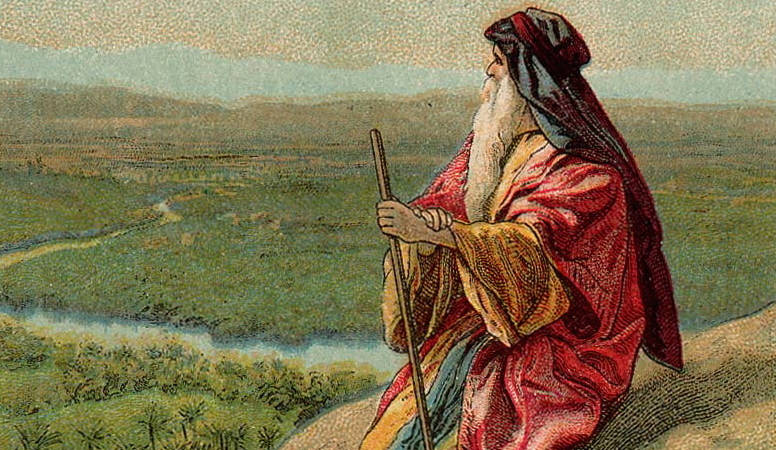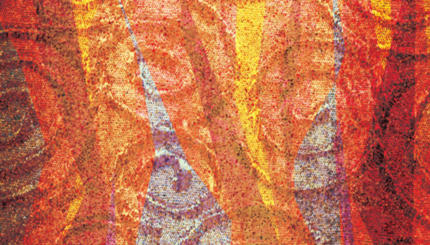Commentary on Parashat Vezot Haberakhah, Deuteronomy 33:1 - 34:12
Moses‘ final blessing to the tribes of Israel forms the coda for the five books of the Torah traditionally attributed to Moses. Often in Deuteronomy, Moses has admonished the people of Israel, sometimes threatening or even bullying them. Throughout the book, however, he also has offered the people blessings and a vision of God’s love and potential rewards. Now, at the very end, Moses fills the people with hope and promise as he speaks to their best selves. As the greatest of teachers, Moses puts into words what they instinctively know what they long for but cannot quite articulate.
Moses and Israel began together as an erstwhile prince leading a band of slaves to freedom. Now, the people Israel are not only free, bur also they are about to be responsible for their own lives in their own land. As they become a sovereign people, Moses (as it were) stitches them together, tribe after tribe, weaving a dramatic finale: “Thus Israel dwells in safety, / Untroubled is Jacob‘s abode.” (Deuteronomy 33:28) This stunning statement confirms the Israelites’ greatest hope, as well as ours today, envisioning a time even beyond the battles that lie ahead, when they finally will live in security and safety.
This Torah portion contains Moses’ last blessing, indeed his last words to the entire people, one nation with many attributes and possibilities. Our Jewish religious tradition of blessings is not one of passive acceptance or recognition; instead, blessings demand action. This is why, for the most part, we recite a blessing before we carry out an action.
The Root of Blessing
Some say that the Hebrew word for blessing (berakhah) shares the same root as the word for knee (berekh), as in “bend the knee.” (Although there are scholars who dispute that theory, certainly our rabbis delighted in such wordplays.) When we recite a blessing, we bend ever so slightly, diminishing ourselves so as to affirm the Other and look deep into ourselves.
With your help, My Jewish Learning can provide endless opportunities for learning, connection and discovery.
Through prayer, we express our gratitude, ask for more blessings, and strive to reach beyond our present limitations. Acknowledging that which is not necessarily in our control, we hope for God’s gifts of a healthy, secure, and bountiful life, a life of purpose and meaning. This is Moses’ berakhah to us, then and now: to gather the best within and around ourselves so as to fulfill the “promise” of the Promised Land.
After Moses blesses the tribes, he then stands atop Mount Nebo and surveys the entire land. Viewing the Negev and the valley of Jericho — city of date palms south to Zoar, perhaps Moses is able to discard all the what if’s, should have’s, maybe’s, and if only’s. Perhaps he feels some sense of closure, an acceptance of what he could and could not accomplish in a lifetime. There is a certain humility in knowing our limits and recognizing when it is time to move on.
Part of Moses’ blessing involves the ability to dream of what he will not see or experience directly. Affirming the future is what leadership is all about: knowing and accepting that our best dreams may be realized by others who come after us. Moses’ words remind us that we need to pray and work for the blessings of justice, equality, and peace in order to fulfill our promise as individuals and to build the best family, community, society, and country that we can. We learn from Moses that sometimes we have to scale mountains in order to come closer to these blessings.
The Civil Rights Connection
The late Rev. Dr. Martin Luther King Jr. invoked the scene on Mount Nebo in the famous speech he delivered in Memphis the day before he was assassinated (1968). He said:
Well, I don’t know what will happen now. We’ve got some difficult days ahead. But it doesn’t matter with me now. Because I’ve been to the mountaintop. And I don’t mind. Like anybody, I would like to live a long life. Longevity has its place. But I’m not concerned about that now. I just want to do God’s will. And He’s allowed me to go up to the mountain. And I’ve looked over. And I’ve seen the promised land. I may not get there with you. But I want you to know tonight, that we, as a people, will get to the promised land. (“I See the Promised Land,” April 3, 1968)
This speech turned out to be Dr, King’s last. Like Moses, his final words were a blessing for justice and peace in the service of God. This legacy of hope and vision of who we can and must become urges us on, reminding us of the dreams that remain for us to actualize.
Whenever we finish a book of the Torah in the synagogue’s cycle of readings, those who are present respond immediately with three words: Chazak, chazak, v’nitchazek! Be strong, be strong [in the singular] and we will be strong [in the plural].” My late father, Rabbi Wolfe Kelman, taught: Why do we say chazak twice, when once would be enough? It is to tell us that if you and I each are strong, then together we are even stronger. In other words, this is a true “win/win” situation: I need you to be strong so I can be strong too.
My father’s lesson is especially true for the Jewish people today. As Jewish women, we need to be strong so that we can experience and contribute to the fullness of our Jewish tradition. Women’s entry into the leadership of Jewish life and their involvement in every aspect of communal, religious, and intellectual life is the blessing of the last 30 years. Women have opened new vistas, introduced innovations in every vital sphere of Jewish living, and empowered themselves and their daughters and granddaughters. The Jewish world has been profoundly reshaped: yet there is still a way to go.
Future generations of women must continue to redefine family and work, renew ritual, scale new horizon s of scholarship, write liturgy and poetry, and make music, all the while recreating the Jewish community and its structures. The Jewish people can only be strong when it embraces all of its members; it takes the involvement of both Jewish women and Jewish men to make our community fuller and more vibrant.
Thus, the reading of the Torah ends with blessings and the charge to strengthen ourselves and our community. Moses teaches us to reach for blessings for ourselves and others, to strive for the humility to know our task, and to dream of how to transform what is to what can be.
Reprinted with permission from The Torah: A Women’s Commentary, edited by Tamara Cohn Eskenazi and Andrea L. Weiss (New York: URJ Press and Women of Reform Judaism, 2008).
Torah
Pronunced: TORE-uh, Origin: Hebrew, the Five Books of Moses.



